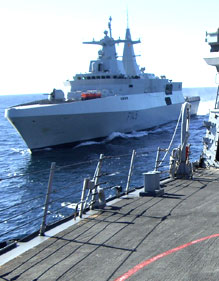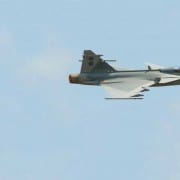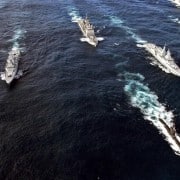|
Getting your Trinity Audio player ready...
|

By Lee-Ann Alfreds
A German arms company did not pay a bribe to arms acquisition chief Chippy Shaik to ensure they won the tender to supply four frigates to the South African Navy.
Testifying before the Arms Procurement Commission, Klaus Wiercimok, senior in-house attorney for ThyssenKrupp Marine Systems, denied the company had paid US$3-million to the former Department of Defence chief of acquisitions – considered by well-informed critics to be the key figure in the subversion and manipulation of South Africa’s controversial multibillion-rand arms deal.
“The one particular allegations (sic) that I would like to go into, this was that we had paid the chief of acquisition of Department of Defence three million US dollars to influence the procurement process.
"I can tell you this is not true. The GFC (German Frigate Consortium) neither made nor authorised such payment. This was the subject of investigations into by the German, or by the State Prosecutor’s office in Dusseldorf. No evidence of the veracity of this was found. We looked into ourselves, no such payments were ever made or authorised,” he testified before the commission last week.
Bribery allegations denied
Critics Paul Holden and Hennie van Vuuren and former ANC MP Andrew Feinstein have all detailed in books how a German investigation uncovered that Shaik was the recipient of a $3-million bribe he solicited from winning bidder ThyssenKrupp.
In their book The Devil in the Detail: How the arms deal changed everything, Holden and Van Vuuren noted a memo from a ThyssenKrupp executive which read: “During one of our meetings he (Chippy Shaik) asked once again for explicit confirmation that the verbal agreement made with him for payment to be made in case of success, to him and a group represented by him, in the amount of 3 million US$. I confirmed this to him.
“Mr Shaik has emphasized that the B+V/TRT offer was pulled into first place in spite of the Spanish offer being 20% cheaper. The Spanish offset was according to him also valued higher than ours. In this respect it had, according to him, been no simple exercise to get us into 1st place.”
But Wiercimok insisted the company had not paid any bribes. He denied that its costs had been inflated to cover the costs of bribes, pointing out that this had been the subject of a German investigation which had found no basis to the claims.
“These allegations have been the subject of the State Prosecutor’s officers in Dusseldorf, starting in 2006. I can only say that no evidence, supporting the allegations by South African sources, that any sort of corruptive practices had taken place in South Africa were ever found. The investigations were closed, without charges being preferred … Neither the company nor any individual was charged or prosecuted with any of such matter.”
Nothing wrong with using advisers, consultants and agents
Wiercimok also denied that Rear Admiral Johnny Kamerman was guilty of post-employment or revolving door corruption, as alleged by critics.
Post-employment refers to the practice of a State employee landing employment with a contractor after the contractor is awarded a tender in which the state employee was involved. He insisted they had got permission from the South African authorities for Kamerman to join ThyssenKrupp.
“Why were we interested in Mr Kamerman, we got to know him, during the acquisition process, as a very able person, not only from a technical point of view, but a person who was able to take through complicated projects and he had international expertise. We thought he would be an excellent addition to the TKMS team, who was about to expand their international business. We found we were glad that Mr Kamerman agreed to join. We got the authority of the chief of the navy, Vice-Admiral Mudimu,” he testified.
Wiercimok also defended the use of advisers, consultants and agents as above-board saying it was “by no means unusual to involve advisers in a deal of this size and portion” and that they had helped the company navigate what was “unknown territory“ because of the UN arms embargo against South Africa in the early 1990s.
He said advisers and consultants were people with “knowledge of people, who know how to deal with the law, with finance, banking, media, public affairs and also access to the decision makers”.
The company was looking for people with a proven track record in South Africa, he said, and this was done according to guidelines that are still in place. “They have to bring in a value addition in the customer country and gain political support and this kind of thing … Obviously the people who advised us here, did not do this for free. The remuneration was agreed with them individually on terms of market conditions, level of expertise, uniqueness of skills and that kind of thing and the time that the advisor would be required to devote to GFC matters, including travel.”
But the advisers were warned that no illicit payments would be condoned, he said,
“They only advised us, as to who to approach and who to, what to take into consideration, when making our offer. They were not able, in my view, to directly influence the outcome.”
He said one of the “decisive advisors” ThyssenKrupp had used was Tony Georgiadis, whose wife Elita had an affair with and later married former president FW de Klerk. Georgiadis was paid about $22-million by Thyssen in instalments between 2000 and 2001.
Cheapest is not always the best
Replying indirectly to the claims that ThyssenKrupp’s bid had not been as cheap as the originally-favoured Spanish bidder Bazan, he pointed out that “best value for money is different to lowest price” and that when it came to ThyssenKrupp’s bid, “the price was evaluated against the whole package of the equipment, delivery on time, budget, lifecycle cost, offset, financing and strategic international relations”.
Asked about cancelling the deal (as can be done in the event that corruption or irregularities are found to have taken place), Wiercimok said he would could hardly imagine what would be the consequence of going back to the beginning.
“You giving us back the ships, us giving you back the money. You would be without a navy. The money has been spent, has been distributed. We find this clause to be very difficult to exercise after such a long time.”
Assessment processes were thorough
Agusta’s head of industrial participation Simon Edge echoed this view in his testimony – Agusta won the tender to supply helicopters to the defence force.
Edge insisted that Agusta’s helicopter “was the lowest cost and the most technically superior solution” and that there was no inducement to any politician or politically-connected individuals to win the tender.
He said a claim in the Patricia de Lille dossier which claimed that Agusta’s helicopter was R43-million more expensive than a competitor was “misleading” as it compared aircraft in a completely different programme.
He also claimed that the “figures (in the dossier) are completely wrong”.
Edge defended the controversial national and defence industrial participation programme (known as offsets, and described in the testimony of former trade and industry minister Alec Erwin as "not a total success” with only 13 690 jobs created and R6-billion in investment generated). He said: “The processes that were used for the assessment, the management and the control of the DIP and the NIP were extremely thorough and extremely detailed and, in my opinion, extremely professional, in the way that they were going about their business.”
He insisted that some of the National Industrial Participation projects Agusta had implemented were still providing employment of South African labour, and still providing export revenue.
“As you are probably aware for every job that is created, there are indirect 20 jobs that are also created. The DTI itself uses a factor of two to one. So, it is not just the jobs that are created, it is the indirect jobs that are also created.”
He said Agusta also considered the Defence Industrial Participation projects as “very successful” as “SA-manufactured avionics are fitted to helicopters that have been sold to Sweden, Malaysia etc.”.
In 2014 alone, Edge said, Agusta “made procurements from South African defence and aerospace companies, in excess of five million Euros. So, that business is still continuing today.”
He defended Agusta’s relationship with the politically-connected Futuristic Business Solutions (FSB), which received 70 sub-contracts that earned it an estimated R750-million from the arms deal.
He said it was “legitimate” and that Agusta had contracted FSB to design a system that was compatible with the South African air force’s system. “There was the air force that signed off the activity that was performed by FBS. So, I think, once again, I think, there is, some of the comments in this report are quite mischievous in, in what they are saying.”
Swedish arms company Saab is to testify on 13 April.








